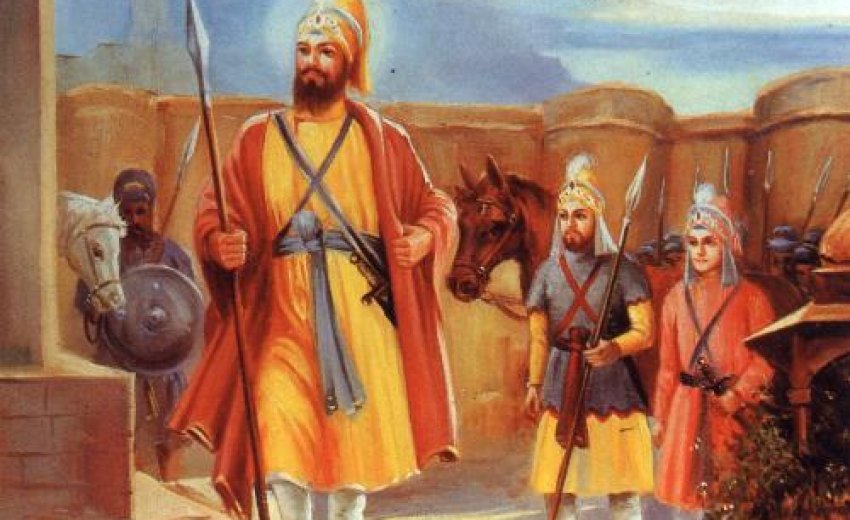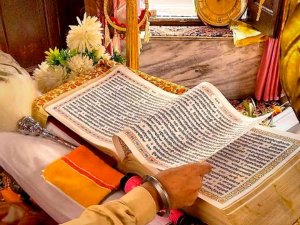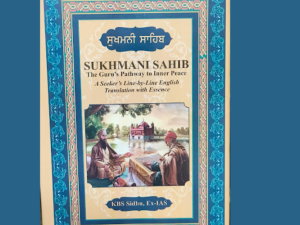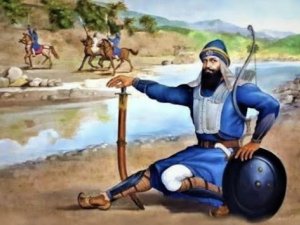The Tenth Nanak of the Sikhs, Guru Gobind Singh, by the grace of Akal Purakh , has created the ideal human form in the world, the Khalsa Panth, and has made it everlasting for the service of the people in a prosperous way. In the struggling life of a few years from childhood to adolescence, Guru Sahib had to face many attacks, storms and difficulties. Circumstances of the time compelled them to realize that there was a need for a very strong military organization against tyranny which could solve the crisis of the society which was accompanied by spirit and courage. Guru Gobind Singh, the embodiment of the revolution, the light of the universe, the glorious noble soul, the flame of unparalleled deeds, the fearless and rising art, shines and forms, acts as a beacon in the history of the world which is all for human freedom. Not only did he fight valiantly to break the mental slavery of the people, but he also brought a new chapter in the history.
Guru Gobind Singh Sahib's determination, self-confidence, courage and spirit of sacrifice paved the way for him to fight the battle of life with fearlessness and non-enmity for all time. Guru Sahib infused such a soul in the dead nation by performing miracles, deeds and blessings in his young age, which was a wonderful miracle in the history of the world. There were times in the life of Kalgidhar Patshah when he had to go hungry, he had thorns in his feet and he accepted many troubles, but he went step by step in his mission. Someone has written for such a prophet.
They are the ones who move with the times.
Men are the ones who change the times.
In May 1704 AD, Anandpur Sahib was surrounded by Mughals, hill tribes and Gujars. Conditions at Anandpur Sahib had become extremely tense. The number of Singhs, Singhanis and innocent children in the fort was about 460. Singhs kept their morale strong even by making a living on the leaves. The Singhs killed and ate some horses inside. The gracious elephant received as a gift from Tripura Raja had also died of starvation. The Singhs could no longer tolerate the hunger. Some Singhs wanted to leave the Anandpur fort. Some Singhs complained to Mata Gujri ji. Kalgidhar Pita with noble Singhs, after considering the decision to make Anandpur Sahib the last goodbye. Guru Sahib had explained to everyone that everyone moves by foot without any halt. It was strictly forbidden to carry any belongings except weapons.
The hill tribes and the Mughals had sworn by the cow and the Quran that they would not be hindered in going out. The dark night of chilly winds, the winter season, the torrential rains, in such an environment, it was a good time to get out of the encirclement of the enemy forces. Guru Sahib had clearly mentioned Emperor Aurangzeb in his letter Zafarnama.
Nivishteh Raseed-o-Guftan Zubaan
B- baayed ki een kar Raahat Rasaan
(It is incumbent on you to fulfill the task undertaken by you and stick to whatever you have written in your letter (about meeting me)
This letter is also mentioned by the author of 'Sri Gurpartap Suraj Granth'.
On one side a silence where you could hear a pin drop, dark night and the overflowing Sarsa river - and on the other side the siege of enemy forces, broken and terrible roads. In the forest. only a handful of Singhs, Singhanis and innocent children with the determination, self-confidence, iron will and sacrifice for the sake of the faith. The caravan consisted of about 460 Singhs, Mata Gujri ji, Char Sahibzada, and others. Among them were 40 Singhs who had taken an oath of allegiance to Guru Sahib. According to the calculated plan, the siege of Anandgarh fort started from May 1704 AD and continued till December 21, 1704, AD and the fort was evacuated at midnight. While crossing the Sarsa river, most of the Singhs, horses, Scriptures, valuable documents and other belongings were swept away in the flooded river. The letter is scheduled to have been written in December 1704, the last week after the battle of Chamkaur. Until then Guru Ji did not know about the rest of the family.
The whole caravan was moving silently to Kiratpur Sahib. It was from Kiratpur to Bilaspur on its way to the Sarsa river when a mountaineer spotted the caravan and informed the troops. The Singhs were informed to follow the hill troops by coming near Jhakhian village. Upon receiving this news, Guru Sahib instructed the fighter Singhs to take a special position. Bhai Udai Singh was ordered to march on the nearby hill with a party of 50 Singhs. Bhai Jeevan Singh (Jaita) was instructed to form a front line on the banks of Sarsa river near Jhakhian village by giving 100 Singhs Orders. Guru Sahib instructed Bhai Udai Singh to inform the group of Sahibzada Ajit Singh and Bhai Budha Singh to cross the river Sarsa and reach the fort of Bhai Nihang Khan in Kotla village. Meanwhile, the younger sons of Mata Gujri Ji, her two servants Bhai Sunna Singh and Bibi Subhikhi crossed the Sarsa river towards Chamkaur. Mata Gujri ji and the two younger sons were taken by the Gangu Brahmin cook to his village Kheri. This ungrateful Gangu got great rewards by arresting Mata Gujri Ji and the innocent children from the Nawab of Sirhind (the same Gangu dynasty later inflicted many atrocities on the Sikhs, which demanded a separate chapter).
Guru Sahib and the Singhs crossed the flooded waters of the Sarsa river, some of the Singhs were lost. Guru Sahib and some Singhs reached the fort of Nihang Khan on the banks of the river Sutlej, passing through the land of Lodhi Majra villages. On the other hand, Bachittar Singh and his party on their way to Ropar had a fierce battle with Malikpur Rangara and Pathans of Ropar. Bachitar Singh was seriously injured. Sahibzada Ajit Singh and other Singhs picked up the wounded Bachitar Singh on the way and brought him to the fort of Nihang Khan where Guru Gobind Singh Sahib and the Singhs were waiting.
Guru Sahib and the Singhs stayed all day in the fort of Nihang Khan. Leaving the injured Bhai Bachitar Singh there for treatment, all Singhs and Guru Sahib left for Lakhmipur at night. Nihang Khan was happy with the service. Guru Sahib presented a shield and a dagger to Nihang Khan. Near the village of Bur Majra, Guru Sahib received information that the enemy was pursuing the Sikh warriors. The enemy army was advancing at high speed and surrounded Chamkaur in all directions. Guru Sahib, while staying in Budhi Chand's Haveli (Fortress of Chamkaur) and confronting the enemy army with forty Sikh warriors, is an important golden page in the annals of world history.
Kaha bir chali chudhavant bhare
kaha ek ne lakh aaye hakare.
(Gurpartap Suraj Granth, Rit: 6)
It is to be noted here that in the forty warriors of Anandpur Sahib, 37 Singhs remained till they reached Chamkaur. Bhai Jeevan Singh, Udai Singh and Bachittar Singh had been martyred. By the time Guru Sahib reached Chamkaur, other Singhs had joined him, numbering 47 (37 Anandpuri Muktas, 8 new Singhs and 2 eldest sons). The battle is well documented in Bachittar Natak.
n the 'Fortress of Chamkaur', a handful of Singhs fought valiantly in which two great princes including 37 Singhs were martyred. By nightfall,Guru Sahib and Panj Singhs remained in the fort. During the night, five Singhs performed Gurmata which Guru Sahib had to accept gladly. On the night of 31st December 1704, Guru Sahib and Three Singhs, with the help of Nabi Khan and Gani Khan, set out from the fort. Only two Singhs, Bhai Sant Singh Bageshri and Bhai Sangat Singh Arora, remained in the fort.
Guru Gobind Singh Ji fought an unprecedented historical battle at Chamkaur . After this battle Guru Ji reached the village of Dina. It was here that the Guru received a conciliatory message from Emperor Aurangzeb through the Qazi and invited him to meet in the Deccan. Although the historian is not unanimous on many points, especially details of sequence, it can be said with certainty that Guru Sahib wrote the letter of victory after the battle of Chamkaur which is mentioned by Guru Sahib in the second letter of the Zafarnamah in couplet number 57.
"Tura gar b-Bayyed aan kaul-i-kurran
B-Nazd-e shuma ra Rasaanam Hamaan
Guru Sahib makes it clear to Aurangzeb that the oath which the emperor sent to him through the Qazi can also be shown to him as evidence. I am sorry for the dominion of yours, so I am sorry again.
As far as historic references are given by Dr Ganda Singh in his Persian book MAKIHZE TWARIKH - E-SIKHAN is as: " A letter written by Chhatrapati Shivaji to Mirza Raja Jai Singh in Persian poetry in July-August 1922, published by the Nagari Pracharini Sabha, Banaras. In the foreword to that letter, he wrote that there were about thirty-five years, he had seen letters from the late Mahant Baba Sumer Singh of Takht Sri Harmandir Sahib, Patna. One was written in the name of Chhatrapati Shivaji's Mirza Raja Jai Singh, the giver of life to the Marathas, and the other was written in the name of Guru Gobind Singh, the founder of the Khalsa Panth to Emperor Aurangzeb. They had copied both letters. But they were placed in a place where it was difficult for them to trace again. About thirty-two years later, Shiva's letter was found in the papers and published in Nagari Pracharini Patrika. But the letter of Guru Gobind Singh could not be traced. After that he tried to get another copy through Pandit Raj Ballabh Deputy Collector, Patna but by that time Baba Sumer Singh Ji had come to Punjab and died. His papers were also scattered. Thus, the letter was lost forever.
As far as Babu Jagannath's memory was concerned, there were not more than one hundred verses in this letter. Nor was it the so-called Zafarnamah. A copy of which was received and sent to him by Pandit Raj Ballabh, Deputy Collector, Patna.
Fortunately, after some time, Babu Jagannath, using his memory, sent some incomplete poems of the letter to Sardar Umrao Singh Shergil Majithia and a copy was sent to Khalsa College, Amritsar on April 18, 1939. A copy of which was given to Bhai Vir Singh at Amritsar by order of Sardar Sahib. Bhai Sahib published the above letter along with the Punjabi translation in his article 'Uch Da Peer' in Khalsa Samachar Amritsar on July 16, 1942. Umrao Singh translated it into Urdu and published it in Lahore in December 1944, with an introduction under the title "Fatehnama''.
The number of couplets received by Sardar Umrao Singh is twenty-three and was published in Ajit Lahore and Khalsa Samachar .
In the annals of history, Guru Gobind Singh is considered to be the embodiment of Chardi Kala. The splendor of Guru Sahib's beauty and glory is a guide for our future generations. He started new chapters of the martyrs' paradigm by giving testimonies of his entire family.
The struggle of Guru Sahib has always been against oppression and deception. Strengthened the oppressed masses of India like a rock against oppression by giving them the concept of courage, valor and enthusiasm. The people of the world still remember him as a prophet who made hawks out of sparrows and lions out of jackals.
Being a resident of Kashmir, it was my long-dreamed project to translate this historic letter of Persian into Urdu, Kashmiri, Punjabi and English. I have tried my best to reach layman readers.
NAMA-E-GURU GOBIND SINGH BA AURANGZEB
ਨਾਮਾ-ਏ-ਗੁਰੂ ਗੋਬਿੰਦ ਸਿੰਘ ਬਾ ਔਰੰਗਜ਼ੇਬ
بـنـام خـداونـد تیغ و تبر
خداوند تیر و سنان و سپر
ਬਨਾਮੇ ਖ਼ਦਾਵੰਦੇ ਤੇਗ਼ੋ-ਤਬਰ
ਖ਼ੁਦਾਵੰਦੇ ਤੀਰੋ ਸਨਾਨੋ ਸਿਪਰ ੧
اردو...شروع اس خدا کے نام سے جو تلوار، کلہاڑا، تیر، ڈھال اور نیزے سے خود کو ظاہر کرتا ہے یعنی یہ سارے ہتھیار اس کی طاقت کی علامات ہین اور اس کی طاقت کو ظاہر کرتے ہیں یعنی وہ بڑا قدرت والا ہے
کاشر...دس تمس دیہ سند ناو ستۍ پس شمشیرو، تبرو، تیرو، ڈھالو تہ نیزو ښتۍ پئن پان پنۍ راوان چھ پانے یم ہتھی یار چھ تہہ سندِ طاقتچ دلیل کہ شہ چھ بڑ طاقتہ وول
ਉਸ ਰੱਬ ਦੇ ਨਾਮ ਤੋਂ ਸ਼ੁਰੂ ਹੋ ਰਿਹਾ ਹਾਂ ਜੋ ਤਲਵਾਰ, ਕਟਾਰ, ਤੀਰ, ਢਾਲ ਅਤੇ ਬਰਛੇ ਨਾਲ ਆਪਣੇ ਆਪ ਨੂੰ ਦਰਸਾਉਂਦਾ ਹੈ, ਯਾਨੀ ਇਹ ਸਾਰੇ ਹਥਿਆਰ ਉਸ ਦੀ ਸ਼ਕਤੀ ਦੀਆਂ ਨਿਸ਼ਾਨੀਆਂ ਹਨ ਅਤੇ ਉਸ ਦੀ ਸ਼ਕਤੀ ਨੂੰ ਦਰਸਾਉਂਦੇ ਹਨ, ਅਰਥਾਤ ਉਹ ਸ਼ਕਤੀਸ਼ਾਲੀ ਹੈ।
Begins with the name of the God who represents himself with sword, axe, arrow, shield and spear, i.e. all these weapons are signs of his power and represent his power (i. e) powerful.
خداوند مردان جنگ آزما
خداوند اسپان پا در هوا
ਖ਼ੁਦਾਵੰਦੇ ਮਰਦਾਨੇ ਜੰਗ ਆਜ਼ਮਾ।
ਖ਼ੁਦਾਵੰਦੇ ਅਸਪਾਨੇ ਪਾ ਦਰ ਹਵਾ। ੨
اردو... وہ خدا ان لوگوں کے ساتھ ہے جو میدان جنگ میں بہادری سے لڑتے ہیں اور اپنے گھوڑوں پر سوار ہواؤں سے باتیں کرتے ہیں یعنی بڑی تیزی سے گھوڑے دوڑاتے ہیں.
كأشر....شہ خودا چھ تمن ولہ ویرن ستۍ یم مأدان جنگس مئز بڑ بہوڈری سان لڑان چھ تہ گرین پیٹھ سوار ہوہکی رفتار ؤڈان چھ
ਉਹ ਰੱਬ ਉਨ੍ਹਾਂ ਦੇ ਨਾਲ ਹੈ ਜੋ ਜੰਗ ਦੇ ਮੈਦਾਨ ਵਿਚ ਬਹਾਦਰੀ ਨਾਲ ਲੜਦੇ ਹਨ ਅਤੇ ਆਪਣੇ ਘੋੜਿਆਂ 'ਤੇ ਹਵਾਵਾਂ ਨਾਲ ਗੱਲ ਕਰਦੇ ਹਨ, ਯਾਨੀ ਘੋੜੇ ਬਹੁਤ ਤੇਜ਼ ਨਾਲ ਦੌੜਦੇੰ ਹਨ।
That God is with those who fight valiantly on the battlefield and talk to the winds on their horses, that is, the horses are very fast,they run.
ہماں کو ترا پادشاہی بداد
بما دولت دیں پناہی بداد
ਹਮਾਂ ਕੋ ਤੁਰਾ ਪਾਦਸ਼ਾਹੀ ਬਿਦਾਰ।
ਬਮਾ ਦੌਲਤੇ ਦੀ ਪਨਾਹੀ ਬਿਦਾਰ। ੩
اردو... وہی (خدا) جس نے تجھے بادشاہی عطا کی اور مجھے دین (مذہب) کی حفاطت کا شرف بخشا
كأشر... سے (خودا) پیمۍ ژۓ بادشاہی دژئے تہ مۓ دینچ راچھ کرنک
ਉਹ (ਰੱਬ) ਜਿਸ ਨੇ ਤੈਨੂੰ ਰਾਜ ਦਿੱਤਾ ਤੇ ਮੈਨੂੰ ਧਰਮ ਦੀ ਰਾਖੀ ਕਰਨ ਦਾ ਮਾਣ ਬਖਸ਼ਿਆ।
He (God) who gave thou the kingdom and gave me the honor of protecting the religion (dharam).
تـرا تـرکـتـازی بـا مکر و ریا
مرا چاره سازی با صدق و صفا
ਤੁਰਾ ਤੁਰਕ ਤਾਜ਼ੀ ਬ ਮਕਰੋ ਰਿਆ।
ਮਰਾ ਚਾਰਹ ਸਾਜ਼ੀ ਬਸਿਦਕੋ ਸਫ਼ਾ ।੪
اردو... تو جھوٹ و دھوکے سے لوٹ مار کرنے لگا ہوا ہے اور میں سچائی اور ایمانداری کے راستے پر گامزن ہوں میں
كأشر... چانۍ کام چھ اپز وئُن تہ دھوکھہ بازی کرتھ لوٹھ
مار کڑن تہ بہ چھس سیز تہ پاک وتہ پیٹھ گامزنالحمد للہ اس کے مویشیوں کی بھلائی ہے۔
ਇਸ ਲਈ ਤੂੰ ਝੂਠ ਅਤੇ ਧੋਖੇ ਨਾਲ ਲੁੱਟ ਰਿਹਾ ਹੇਂ ਅਤੇ ਮੈਂ ਸੱਚ ਅਤੇ ਇਮਾਨਦਾਰੀ ਦੇ ਰਾਹ 'ਤੇ ਹਾਂ।
So thou are robbing with lies and deception and I am on the path of truth and honesty.
نه زیبد ترا نام اورنگ زیب
ز اورنگ زیبان نه یابد فریب
ਨ ਜ਼ੇਬਦ ਤੁਰਾ ਨਾਮਿ ਔਰੰਗਜ਼ੇਬ।
ਕਿ ਔਰੰਗਜ਼ੇਬ ਨਿਆਯਦ ਫ਼ਰੇਬ। ੫
اردو...تجھ پر اورنگ زیب نام نہیں جچتا کیونکہ جو بادشاہ تخت/سلطنت کی شان ہوتا ہے وہ دھوکے بازی میں ملوث نہیں ہوتا
کاشر.... ڑے پیٹھ چھنہ اورنگ زیب ناو شؤہانے کیاز کہ اورنگ زیبک مانے چھ تختچ شؤب مگر ژ چھکھ دھوکھہ باز
ਤੈਨੂੰ ਔਰੰਗਜ਼ੇਬ ਨਾਂ ਇਸ ਲਈ ਸ਼ੋਭਾ ਨਹੀਂ ਦੇਂਦਾ ਕਿਉਂਕਿ ਜਿਹੜਾ ਬਾਦਸ਼ਾਹ ਸਿੰਘਾਸਣ/ਰਾਜ ਦੀ ਸ਼ਾਨ ਹੈ, ਉਹ ਧੋਖੇਬਾਜ਼ੀ ਵਿੱਚ ਗੁਲਤਾਨ ਨਹੀਂ ਹੁੰਦਾ।
Thou do not get the name Aurangzeb because the king who is the glory of the throne / kingdom is not deceived.
تسبیحت از سجه و رشته بیش
کزاں دانه سازی وزاں دام خویش
ਨ ਤਸਬੀਹਤ ਅਜ਼ ਸਜੋ ਰਿਸ਼ਤਹਏ ਬੇਸ਼।
ਕਜ਼ਾ ਦਾਨਾ ਸਾਜ਼ੀ ਵਜ਼ਾ ਦਾਮਿ ਖ਼ੇਸ਼ ।੬
اردو...اورنگ زیب ! تمہاری تسبیح چند دانوں اور دھاگے سے زیادہ کچھ نہیں تم ہر گنتے دانے کے ساتھ دوسروں کو جال میں پھانستے ہو
كأشر...اورنگ زیب ! چانۍ تسبیح پھرنۍ چھنہ کینہی محض دھوکھہ بازی تہ ژ چھکھ امہ تسبیح پھرنہ ستۍ بأقین پننس زالس مثز
ਔਰੰਗਜ਼ੇਬ! ਤੇਰੀ ਮਾਲਾ ਕੁੱਝ ਦਾਣਿਆਂ ਅਤੇ ਧਾਗੇ ਤੋਂ ਵੱਧ ਕੁੱਝ ਨਹੀਂ ਹੈ, ਹਰੇਕ ਗਿਣੇ ਹੋਏ ਦਾਣੇ ਨਾਲ ਤੁਸੀਂ ਦੂਜਿਆਂ ਨੂੰ ਫਸਾਉਂਦੇ ਹੋ।
Aurangzeb! Thine rosary is nothing more than a few grains and thread, with every counted grain thou are entangled.
تو خاک پدر را با کردار زشت
با خون برادر بدادی سرشت
ਤੂ ਖ਼ਾਕਿ ਪਿਦਰ ਰਾ ਬਿ ਕਿਰਦਾਰੇ ਜ਼ਿਸਤ ।
ਬਖ਼ੂਨੇ ਬਿਰਾਦਾਰ ਬਿਦਾਦੀ ਸਰਿਸ਼ਤ ।੭
اردو... تم نے اپنی بد کرداری سے اپنے باپ کا نام مٹی میں ملا دیا ہے اور اپنے بھائیوں کے خون سے اپنے برے کاموں میں اضافہ کر دیا ہے
کأشر... ژۓ گرتھ پنہ نبو کوکارو ښتۍ پنہ نس مألۍ سندس ناوس رب تہ پنہ نین باین ہند خونہ ستۍ لتھہ وتھ پننۍ اتھہ
ਤੂੰ ਆਪਣੇ ਮਾੜੇ ਕਰਮਾਂ ਨਾਲ ਆਪਣੇ ਪਿਤਾ ਦਾ ਨਾਮ ਮਿੱਟੀ ਵਿੱਚ ਮਿਲਾ ਦਿੱਤਾ ਹੈ ਅਤੇ ਆਪਣੇ ਭਰਾਵਾਂ ਦੇ ਖੂਨ ਨਾਲ ਆਪਣੇ ਮਾੜੇ ਕੰਮਾਂ ਨੂੰ ਵੱਧਾ ਦਿੱਤਾ ਹੈ।
Thou have mixed your father's name in the dust with thine bad deeds and increased thy bad deeds with the blood of thine brothers.
وزاں خانہ خام کردی بنا
برای در دولت خویش
ਵਜ਼ਾ ਖ਼ਾਨਾਇ ਖ਼ਾਮ ਕਰਦੀ ਬਿਨਾ।
ਬਰਾਏ ਦਰੇ ਦੌਲਤੇ ਖ਼ੇਸ ਰਾ। ੮
اردو... اور اس کام سے (اپنے باپ کو قید اور بھائ کرنے سے) تم نے اپنی سلطنت کی ناپختہ (خام) بنیاد ڈالی ہے.
كأشر... امہ کامہ ستۍ پانے پٹن مول بند تہ بأے مارنہ ہتی تژاؤتھ ڑے پننہ خام حکومتچ بنی یاد مطلب وونۍ چھے ڑے زوال پنہ وول
ਅਤੇ ਇਹ ਕਰ ਕੇ (ਆਪਣੇ ਪਿਤਾ ਅਤੇ ਭਰਾਵਾਂ ਨੂੰ ਕੈਦ ਕਰਕੇ) ਤੂੰ ਆਪਣੇ ਰਾਜ ਦੀ ਬੇਪੱਤੀ (ਕੱਚੀ) ਨੀਂਹ ਰੱਖੀ ਹੈ।
And with this work (by imprisoning your father and brothers) thou have laid the immature (raw) foundation of your kingdom.
من اکنون بہ افظال پرش اکال
کنم ز آب آہن چنان بر شگال
ਮਨ ਅਕਨੂੰ ਬਿ ਅਫ਼ਜ਼ਾਲਿ ਪੁਰਸ਼ਿ ਅਕਾਲ।
ਕੁਨਮ ਆਬਿ ਆਹਨ ਚੁਨਾ ਬਰ ਸ਼ਗਾਲ। ੯
اردو... اب میں نے خدا کے فضل و کرم سے اپنے بہادر سپاہیوں کے لئے ایسا آہنی پانی (امرت) تیار کیا ہے (یہاں اشارہ ہے گرو گوبند سنگھ جی کی فوج کی طرف) جو تم پر (اورنگ زیب پر) طوفان کی طرح برسے گا.
کاشر... مے کور پنہ نبن ولہ ویرن ہند باپتھ تیؤتھ دور آب (امرت) تیار (یانے فوج) پس ژۓ پیٹھ یس رؤډکۍ پاٹھۍ وسہ حملہ آور بنتھی
ਹੁਣ ਵਾਹਿਗੁਰੂ ਦੀ ਕਿਰਪਾ ਨਾਲ ਮੈਂ ਆਪਣੇ ਬਹਾਦਰ ਸਿਪਾਹੀਆਂ ਲਈ (ਇੱਥੇ ਗੁਰੂ ਗੋਬਿੰਦ ਸਿੰਘ ਜੀ ਦੀ ਫੌਜ ਵੱਲ) ਇੱਕ ਅਜਿਹਾ ਆਬੇ-ਹਯਾਤ (ਅੰਮ੍ਰਿਤ) ਤਿਆਰ ਕਰ ਲਿਆ ਹੈ, ਜੋ ਤੇਰੇ ਉੱਤੇ (ਔਰੰਗਜ਼ੇਬ ਉੱਤੇ) ਤੂਫ਼ਾਨੀ ਮੀਂਹ ਵਾਂਗ ਬਰਸੇ ਗਾ।
Now, by the grace of God, I have prepared such an ambrosial water (nectar) for my brave soldiers (here towards Guru Gobind Singh Ji's army) which stormed thou (on Aurangzeb) like rain.
.ز کوه دکن تشنہ کام آمدی
ز میواڑ ہم تلخ جام آمدی
ਜ਼ਿ ਕੋਹਿ ਦਕੱਨ ਤਿਸਨਾ ਕਾਮ ਆਮਦੀ।
ਜ਼ਿ ਮੇਵਾੜ ਹਮ ਤਲਖ ਜਾਮ ਆਮਦੀ। ੧੦
اردو... تو دکن کے پہاڑوں (جنوب ہند) سے پیاسا لوٹ کر آیا یعنی شکست کھا کر آیا اور میواڑ (علاقہ راجپوت) سے بھی تلخ جام پی کر آیا یعنی وہاں سے بھی ہار کر آیا
کأشر... ژ آؤکھ دکنہ کیو کوہو پانے جنوبی ہندوستانہ پیٹھ تہ تژیشہ ہوئے مطلب ہارتھ تہ میواڑ کیو ربریں سو چوں اکنوں نگاہت رودآن تلخی و تشنگی ات رو
ਇਸ ਲਈ ਉਹ ਦੱਖਣ (ਦੱਖਣੀ ਭਾਰਤ) ਦੇ ਪਹਾੜਾਂ ਤੋਂ ਪਿਆਸਾ, ਭਾਵ ਹਾਰ ਕੇ ਵਾਪਸ ਆ ਗਿਆ |
So, thou came back from the mountains of the South (South India) thirsty, meaning defeated.
بریں سو چوں اکنوں نگاہت رود
کہ آن تلخی و تشنگی ات رود
ਬਰੀ ਸੂ ਚੂੰ ਅਕਨੂੰ ਨਿਗਾਹਤ ਰਵੱਦ ।
ਕਿ ਆਂ ਤਲਖ਼ਿਓ ਤਿਸ਼ਨਗੀਨਤ ਰਵੱਦ। ੧੧
اردو... اب تم اپنی نظریں اس طرف (پنجاب کی طرف) جمائے ہوئے ہو لیکن یاد رکھنا یہاں بھی تمہاری پیاس نہیں بجھانے دوں تمہارے حوالے نہیں کروں گا گا یعنی یہ خطہ
كأشر... وونۍ چھکھ ژ یوگن یانے پنجابس کن نظر تھاوتھ مگر یاد تھاوۍ زے یور تہ تھاؤتھ تژیشہ ہوتے مطلب پنجاب دمے نہ کھینہ
ਹੁਣ ਤੂੰ ਆਪਣੀਆਂ ਨਜ਼ਰਾਂ ਇਸ ਪਾਸੇ (ਪੰਜਾਬ ਵੱਲ) ਟਿਕਾਈ ਬੈਠੇ ਹੋ ਪਰ ਇੱਥੇ ਵੀ ਯਾਦ ਰੱਖਣਾ ਮੈਂ ਤੇਰੀ ਪਿਆਸ ਨਹੀਂ ਬੁਝਾਂਗਾ। ਮੈਂ ਤੇਰੇ ਹਵਾਲੇ ਇਸ ਇਲਾਕੇ ਨੂੰ ਨਹੀਂ ਕਰਾਂਗਾ।
Now your eyes are fixed on this side (towards Punjab) but remember here also, I will not quench your thirst I will not hand over to you i.e. this area.
چناں آتشے زیـر نعلت نہم
ز پنجاب آبت نہ خوردن دہم
ਚੁਨਾਂ ਆਤਸ਼ਿ ਜ਼ੇਰਿ ਨਾਅਲਤ ਨਹਮ
ਜ਼ਿ ਪੰਜਾਬ ਆਬਤ ਨ ਖ਼ੁਰਦਨ ਦਿਹਮ ੧੨
اردو... اگر تم پنجاب کی طرف آئے بھی تو تمہارے پیروں کے نیچے آگ رکھوں گا یعنی تمہارا برا حشر کروں گا اور پنجاب کے پانی سے تمہیں ایک قطرہ بھی نہیں پینے دوں گا
کاشر... اگر ژۓ پنجاب کن نظر تہ پڑتھ یاد تھاوۍ زے نار زالتھ مطلب سبٹھاہ بد حال تھاؤتھ کرتھ تہ پنجابہ کہ آبہ منز دمے نہ اکھ قطر تہ چینہ
ਤੂੰ ਭਾਵੇਂ ਪੰਜਾਬ ਆ, ਤੇਰੇ ਪੈਰਾਂ ਹੇਠ ਅੱਗ ਰੱਖਾਂਗਾ।
even if thou come to Punjab, I will keep fire under your feet.
چہ شد گر شغالے با مکر و ریا
ہمیں کشت دو بچہ شیر را
ਚਿਹ ਸ਼ੁਦ ਗਰ ਸ਼ਿਗਾਲਿ ਬਿ ਮਕਰੋ ਰਿਯਾ
ਹਮੀ ਕੁਸ਼ਤ ਦੋ ਬਚਾਇ ਸ਼ੇਰ ਰਾ ੧੩
اردو... کیا ہوا اگر کسی گیدڑ نے اپنی مکاری اور دھوکے بازی سے شیر کے (میرے) دو بچے مار ڈالے اس میں کوئی بڑی بات نہیں
كأشر...اتھ مثز کس بڑ کتھ چھ یا یہ کس کمال چھ اگر ایکی شالن پننہ چالبازی تہ مکاری ستی ایکس بہ پانے میانی و شری ماری
ਜੇ ਕੋਈ ਲੂੰਬੜੀ ਆਪਣੀ ਚਲਾਕੀ ਅਤੇ ਧੋਖੇ ਨਾਲ (ਮੇਰੇ) ਦੋ ਬੱਚਿਆਂ ਨੂੰ ਮਾਰ ਦੇਵੇ ਤਾਂ ਕੀ ਹੋਵੇਗਾ?
What if a fox kills (my) two children with his cunning and deception?
چوں شیر ژیان زنده ماند ہمی
ز تو انتقام ستاند ہمی
ਚੂੰ ਸ਼ੇਰੇ ਜ਼ਿਆ ਜ਼ਿੰਦਾ ਮਾਨਿਦ ਹਮੇ
ਜ਼ਿ ਤੋ ਇੰਤਕਾਮੇ ਸਿਤਾਨਦ ਹਮੇ ੧੪
اردو...چوں کہ طاقتور شیر ( گرو گوبند سنگھ جی) ابھی زندہ ہے اور تجھ سے انتقام لے کر رہے گا
کاشر... یہ کتھ تھاو ذہنس مثز کہ طاقتور ہہہ چھ وونۍ زندے تہ ڑے پنہ نبن نچوبن ہند بدلہ/حساب کتاب ہیون چھ وونۍ باقی
ਕਿਉਂਕਿ ਸ਼ਕਤੀਸ਼ਾਲੀ ਸ਼ੇਰ (ਗੁਰੂ ਗੋਬਿੰਦ ਸਿੰਘ ) ਅਜੇ ਵੀ ਜਿੰਦਾ ਹੈ ਅਤੇ ਤੇਰੇ ਤੋਂ ਬਦਲਾ ਲਵੇਗਾ।
Because the powerful lion (Guru Gobind Singh ) is still alive and will take revenge on you.
بہ سوگند تو اعتبارے نہ ماند
مرا جز بہ شمشیر کارے نہ ماند
ਬਿ ਸੋਗੰਦਿ ਤੋ ਏਤਬਾਰੇ ਨ ਮਾਂਦ
ਮਰਾ ਜੁਜ਼ ਬ ਸ਼ਮਸ਼ੀਰ ਕਾਰੇ ਨ ਮਾਂਦ ੧੬
اردو... مجھے اب تمہارے عہد و پیماں یعنی قسموں پر اب اعتبار نہ رہا اور اب میرے پاس تلوار اٹھانے کے سوا اور کوئی راستہ نہیں بچا
کاشر... مۓ رود نہ وونۍ چانین قسمن پیٹھ کاثہہ یقین تہ مے برونہہ کنہ چھنہ وونۍ تلوار ثلنہ ورأے کاثہہ دویم چارے
ਮੈਨੂੰ ਹੁਣ ਤੁਹਾਡੀਆਂ ਕਸਮਾਂ 'ਤੇ ਭਰੋਸਾ ਨਹੀਂ ਹੈ, ਅਤੇ ਹੁਣ ਮੇਰੇ ਕੋਲ ਤਲਵਾਰ ਚੁੱਕਣ ਤੋਂ ਇਲਾਵਾ ਕੋਈ ਚਾਰਾ ਨਹੀਂ ਹੈ।
I no longer trust your vows, and now I have no choice but to take up the sword.
توئی گرگ باران کشیده اگر
نہم نیز شیـرے ز دامے بدر
ਤੂਈ ਗੁਰਗਿ ਬਾਰਾਂ ਕਸ਼ੀਦਾ ਅਗਰ
ਨਿਹਮ ਨੀਜ਼ ਸ਼ੇਰੇ ਜ਼ਿ ਦਾਮੇ ਬਦਰ ੧੭
اردو... تو اگر تجربہ کار شخص ہے یعنی بھیڑیے کی طرح پھرتیلا تو میں بھی اپنے شیر کو یعنی اپنی فوج کو تمہارے جال سے باہر رکھوں گا. انہیں تمہاری چالبازی کا شکار نہیں ہونے دوں گا
کاشر... اگر ژ گائل چھکھ تجربہ تھاون وول چھکھ چالاکھ چھکھ سمجان پانس بہ تہ تھاون پئن سہہ پانے پئُن لشکر چانییو زالو نش پتھ چون شکار دمکھ نہ سپدنہ
ਇਸ ਲਈ ਜੇ ਕੋਈ ਤਜਰਬੇਕਾਰ ਬੰਦਾ ਹੈ, ਭਾਵ ਬਘਿਆੜ ਵਰਗਾ ਬਘਿਆੜ ਹੈ, ਤਾਂ ਮੈਂ ਵੀ ਆਪਣੇ ਸ਼ੇਰ ਯਾਨੀ ਆਪਣੀ ਫ਼ੌਜ ਨੂੰ ਤੇਰੇ ਜਾਲ ਤੋਂ ਬਾਹਰ ਰੱਖਾਂਗਾ। ਮੈਂ ਉਹਨਾਂ ਨੂੰ ਤੇਰੀ ਚਲਾਕੀ ਦਾ ਸ਼ਿਕਾਰ ਨਹੀਂ ਹੋਣ ਦਿਆਂਗਾ।
So if there is an experienced person, that is, a wolf like a wolf, then I too will keep my lion i.e. my army out of your trap. I will not let them fall prey to your cunning.
بہ میداں دو لشکر صف آرا شوند
وزاں خانہ خام کردی بنا
ਬਿ ਮੈਦਾਂ ਦੋ ਲਸ਼ਕਰ ਸਫ਼ੱਆਰਾ ਸ਼ਵੰਦ
ਜ਼ਿ ਦੂਰੀ ਬਹਮ ਆਸ਼ਕਾਰਾ ਸ਼ਵੰਦ ੧੯
اردو... چلو دونوں اطراف کی افواج میدان جنگ میں اتنے فاصلے سے آمنے سامنے آ جائیں کہ ایک دوسرےدیکھ سکیں
كأشر... وولہ پٹن لشکر ہپتھ مأدان جنگس مثز مگر مثزباگ یؤتاه دؤربر تھاوتھ کہ اکھ أکس ہیکو وچھتھ۔
ਦੋਵਾਂ ਪਾਸਿਆਂ ਦੀਆਂ ਫ਼ੌਜਾਂ ਨੂੰ ਜੰਗ ਦੇ ਮੈਦਾਨ ਵਿੱਚ ਇੰਨੀ ਦੂਰੀ ਤੋਂ ਆਹਮੋ-ਸਾਹਮਣੇ ਆਉਣ ਦਿਓ ਕਿ ਉਹ ਇੱਕ ਦੂਜੇ ਨੂੰ ਦੇਖ ਸਕਣ।
Let the forces of both sides come face to face on the battlefield from such a distance that they can see each other.
میاں ہر دو ماند دو فرسنگ راه
چون آراستہ گردد این رزم گاہ
ਮਿਆਨਿ ਦੋ ਮਾਨਿਦ ਦੋ ਫਰਸੰਗ ਰਾਹ
ਚੂੰ ਆਰਸਤਾ ਗਰਦਦ ਈਂ ਰਜ਼ਮ ਗਾਹ ੨੦
اردو...جب یہ لڑائی شروع ہو جائے تو میدان جنگ میں دونوں فریقین کے درمیان دو فرلانگ کا فاصلہ ہونا چاہئے
کاشر... ییلہ دؤن فریقن مثز لڑاے لگہ کم کھوتہ کم گڑھہ پانہ وانی ۲ فرلانگ پانے ۴۴۰ گز دؤربر روژن
ਜਦੋਂ ਇਹ ਲੜਾਈ ਸ਼ੁਰੂ ਹੁੰਦੀ ਹੈ ਤਾਂ ਜੰਗ ਦੇ ਮੈਦਾਨ ਵਿੱਚ ਦੋਹਾਂ ਧਿਰਾਂ ਵਿੱਚਕਾਰ ਦੋ ਫਰਲਾਂਗ ਦੀ ਦੂਰੀ ਹੋਣੀ ਚਾਹੀਦੀ ਹੈ।
When this fight starts, there should be a distance of two furlongs between the two sides on the battlefield.
ازاں پس در آں عرصہ کارزار
من آیم بہ نزد تو با دو سوار
ਅਜਾਂ ਪਸ ਦਰਾਂ ਅਰਸਾਇ ਕਾਰਜ਼ਾਰ
ਮਨ ਆਇਮ ਜੁਰੀਦਾ ਤੂ ਬਾ ਦੋ ਸਵਾਰ ੨੧
اردو...اس کے بعد میں اپنے دو ساتھیوں کے ہمراہ گھوڑے پر سوار ہوکر میدان جنگ میں تم سے نبرد آزما
كأشر... پتہ یم بہ مأدان جنگس منز پېنۍ ز (۲) سوار ہیتھ ڑے ہستی لڑنے
ہونے آؤں گا
ਉਸ ਤੋਂ ਬਾਅਦ ਮੈਂ ਆਪਣੇ ਦੋ ਸਾਥੀਆਂ ਨਾਲ ਘੋੜੇ 'ਤੇ ਆਵਾਂਗਾ ਅਤੇ ਤੇਰੇ ਨਾਲ ਮੈਦਾਨੇ - ਜੰਗ ਵਿੱਚ ਲੜਾਂਗਾ।
After that I will come on horseback with my two companions that thou will fight on the battlefield.
تو از ناز و نعمت ثمر خورده
ز جنگی جواناں نہ بر خورده
ਤੂ ਅਜ਼ ਨਾਜੋਨੇਮਤਾ ਸਮਰ ਖ਼ੁਰਦਾਈ
ਜ਼ਿ ਜੰਗੀ ਜਵਾਨਾ ਨ ਬਰ ਖ਼ੁਰਦਾਈ ੨੨
اردو... تم صرف ناز و نعمت رہ کر زندگی کے پھلوں سے لطف اندوز ہوتے آئے ہو لیکن ابھی تک تمہارا سامنا بہادروں سے نہیں ہوا ہے
کاشر... ژۓ چھے ؤنیک تام عاش مژ زندگی بندین میون بند مزے یوت و چهفت مگر جنگہ کین ولہ ویرن ہند مقابلہ چھے نہ کورمت پانے وونۍ وچھکھ ژ جنگ کتھ چھ ونا
ਤੂੰ ਮਾਣ ਅਤੇ ਬਖਸ਼ਿਸ਼ ਕਰਕੇ ਹੀ ਜੀਵਨ ਦੇ ਫੱਲ ਭੋਗਦੇ ਰਿਹਾ ਹੇਂ ਪਰ ਤੂੰ ਅਜੇ ਤੱਕ ਬਹਾਦਰਾਂ ਦਾ ਸਾਹਮਣਾ ਨਹੀਂ ਕੀਤਾ।
Thou have been enjoying the fruits of life only because of pride and blessings but thou have not yet faced the brave.
بہ میداں بیا خود بہ تیغ و تبر
مـكـن خـلـق خـلاق زیر و زبر
ਬ ਮੈਦਾਂ ਬਿਆ ਖ਼ੁਦ ਬਿ ਤੇਗੋ ਤਬਰ
ਮਕੁਨ ਖ਼ਲਿਕ ਖ਼ਲਾੱਕ ਜ਼ੇਰੋ ਜ਼ਬਰ ੨੩
اردو... آجا خود میدان جنگ میں اپنی پوری طاقت کے ساتھ یعنی تلوار و کلہاڑا لیکر اور خدا کی مخلوق یعنی بے گناہ لوگوں کو ستانا چھوڑ
كأشر... وولہ پانہ جنگہ کس مأدانس مثز پئن سوڑے طاقت ہپتھ پانے شمشیر تہ مکڑ ہیتھ. وولہ کر (میون تہ مثانین ولہ ویرن ہند) مقابلہ کیاز چھکھ خودایہ سندبن پاد کرۍ متبن موصوم لؤکن پیٹھ ظولم کران. تژاو امن پیٹھ یہ ظؤلم کرن
ਆਪਣੀ ਪੂਰੀ ਤਾਕਤ (ਅਰਥਾਤ ਤਲਵਾਰ ਅਤੇ ਕਟਾਰ)
ਨਾਲ ਮੈਦਾਨ-ਏ-ਜੰਗ ਵਿੱਚ ਆਓ ਅਤੇ ਰੱਬ ਦੇ ਪ੍ਰਾਣੀਆਂ( ਭਾਵ ਨਿਰਦੋਸ਼ ਲੋਕਾਂ) 'ਤੇ ਜ਼ੁਲਮ ਕਰਨਾ ਬੰਦ ਕਰੋ।
Come on the battlefield with all your strength ( i.e. sword and axe) and stop persecuting God's creatures i.e. innocent people.





